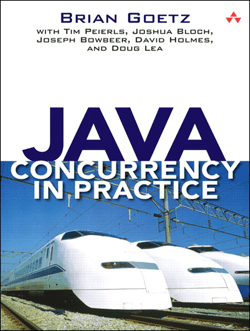I touched on this problem in one of my recent webinars, now it’s time to explain it in writing. Thread-safety is an important quality of classes in languages/platforms like Java, where we frequently share objects between threads. The issues caused by lack of thread-safety are very difficult to debug, since they are sporadic and almost impossible to reproduce on purpose. How do you test your objects to make sure they are thread-safe? Here is how I’m doing it.
Let us say there is a simple in-memory bookshelf:
class Books {
final Map<Integer, String> map =
new ConcurrentHashMap<>();
int add(String title) {
final Integer next = this.map.size() + 1;
this.map.put(next, title);
return next;
}
String title(int id) {
return this.map.get(id);
}
}
First, we put a book there and the bookshelf returns its ID. Then we can read the title of the book by its ID:
Books books = new Books();
String title = "Elegant Objects";
int id = books.add(title);
assert books.title(id).equals(title);
The class seems to be thread-safe, since we are using the thread-safe ConcurrentHashMap instead of a more primitive and non-thread-safe HashMap, right? Let’s try to test it:
class BooksTest {
@Test
public void addsAndRetrieves() {
Books books = new Books();
String title = "Elegant Objects";
int id = books.add(title);
assert books.title(id).equals(title);
}
}
The test passes, but it’s just a one-thread test. Let’s try to do the same manipulation from a few parallel threads (I’m using Hamcrest):
class BooksTest {
@Test
public void addsAndRetrieves() {
Books books = new Books();
int threads = 10;
ExecutorService service =
Executors.newFixedThreadPool(threads);
Collection<Future<Integer>> futures =
new ArrayList<>(threads);
for (int t = 0; t < threads; ++t) {
final String title = String.format("Book #%d", t);
futures.add(service.submit(() -> books.add(title)));
}
Set<Integer> ids = new HashSet<>();
for (Future<Integer> f : futures) {
ids.add(f.get());
}
assertThat(ids.size(), equalTo(threads));
}
}
First, I create a pool of threads via Executors. Then I submit ten objects of type Callable via submit(). Each of them will add a new unique book to the bookshelf. All of them will be executed, in some unpredictable order, by some of those ten threads from the pool.
Then I fetch the results of their executors through the list of objects of type Future. Finally, I calculate the amount of unique book IDs created. If the number is 10, there were no conflicts. I’m using the Set collection in order to make sure the list of IDs contains only unique elements.
The test passes on my laptop. However, it’s not strong enough. The problem here is that it’s not really testing the Books from multiple parallel threads. The time that passes between our calls to submit() is large enough to finish the execution of books.add(). That’s why in reality only one thread will run at the same time. We can check that by modifying the code a bit:
AtomicBoolean running = new AtomicBoolean();
AtomicInteger overlaps = new AtomicInteger();
Collection<Future<Integer>> futures =
new ArrayList<>(threads);
for (int t = 0; t < threads; ++t) {
final String title = String.format("Book #%d", t);
futures.add(
service.submit(
() -> {
if (running.get()) {
overlaps.incrementAndGet();
}
running.set(true);
int id = books.add(title);
running.set(false);
return id;
}
)
);
}
assertThat(overlaps.get(), greaterThan(0));
With this code I’m trying to see how often threads overlap each other and do something in parallel. This never happens and overlaps is equal to zero. Thus our test is not really testing anything yet. It just adds ten books to the bookshelf one by one. If I increase the amount of threads to 1000, they start to overlap sometimes. But we want them to overlap even when there’s a small number of them. To solve that we need to use CountDownLatch:
CountDownLatch latch = new CountDownLatch(1);
AtomicBoolean running = new AtomicBoolean();
AtomicInteger overlaps = new AtomicInteger();
Collection<Future<Integer>> futures =
new ArrayList<>(threads);
for (int t = 0; t < threads; ++t) {
final String title = String.format("Book #%d", t);
futures.add(
service.submit(
() -> {
latch.await();
if (running.get()) {
overlaps.incrementAndGet();
}
running.set(true);
int id = books.add(title);
running.set(false);
return id;
}
)
);
}
latch.countDown();
Set<Integer> ids = new HashSet<>();
for (Future<Integer> f : futures) {
ids.add(f.get());
}
assertThat(overlaps.get(), greaterThan(0));
Now each thread, before touching the books, waits for the permission given by latch. When we submit them all via submit() they stay on hold and wait. Then we release the latch with countDown() and they all start to go, simultaneously. Now, on my laptop, overlaps is equal to 3-5 even when threads is 10.
And that last assertThat() crashes now! I’m not getting 10 book IDs, as I was before. It’s 7-9, but never 10. The class, apparently, is not thread-safe!
But before we fix the class, let’s make our test simpler. Let’s use RunInThreads (renamed to just Threads in the recent version) from Cactoos, which does exactly the same as we’ve done above, but under the hood:
class BooksTest {
@Test
public void addsAndRetrieves() {
Books books = new Books();
MatcherAssert.assertThat(
t -> {
String title = String.format(
"Book #%d", t.getAndIncrement()
);
int id = books.add(title);
return books.title(id).equals(title);
},
new RunsInThreads<>(new AtomicInteger(), 10)
);
}
}

The first argument of assertThat() is an instance of Func (a functional interface), accepting an AtomicInteger (the first argument of RunsInThreads) and returning Boolean. This function will be executed on 10 parallel thread, using the same latch-based approach as demonstrated above.
This RunInThreads seems to be compact and convenient, I’m using it in a few projects already.
By the way, in order to make Books thread-safe we just need to add synchronized to its method add(). Or maybe you can suggest a better solution?
P.S. I learned all this from Java Concurrency in Practice by Goetz et al.
Do you create unit tests to prove that your classes are thread-safe?
— Yegor Bugayenko (@yegor256) August 12, 2018

